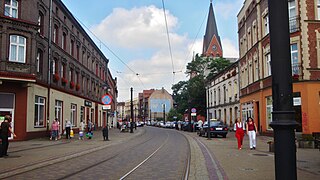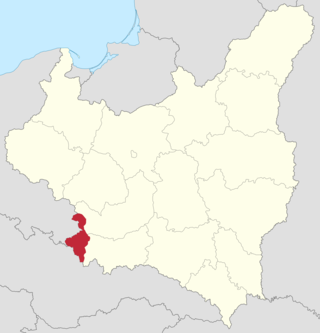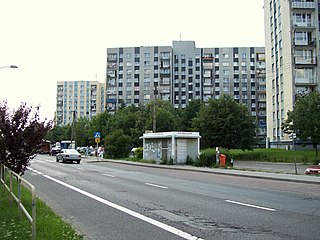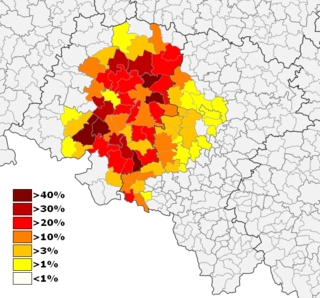
Franciszek Fesser (born 16 August 1885 in Rogi, died 23 October 1956 in Piotrowice (Katowice), was a Polish politician, He was deputy of the Silesian Parliament from 1930 to 1939.

Franciszek Fesser (born 16 August 1885 in Rogi, died 23 October 1956 in Piotrowice (Katowice), was a Polish politician, He was deputy of the Silesian Parliament from 1930 to 1939.
During his youth Fesser worked as a miner in the "Cleopas" mine. In 1918 he joined the Polish Military Organisation in his home district of Opole, where he took part in the 1921 plebiscite in Upper Silesia and the Silesian Uprisings against German rule. When the eastern part of Silesia came under Polish control in 1922, he continued to participate in national-patriotic organisations, including the Association of Silesian Insurgents and the Union for the Defence of the Western Borderlands. Fesser was active in the trade union movement, and helped to organise the Trade Union of the Mining Industry under the Union of Trade Unions. In 1926, he became involved in the National Christian Labour Union, and was elected as a deputy to the third Silesian Parliament in 1930. During this first term, he was a member of the Commission of Labour and Social Welfare, and in 1935 he was re-elected to the fourth Silesian Parliament. During this time, he was Vice-Chairman of the Commission of Labour and Social Welfare, and also worked in the Local Authority, Regulations and Budget and Taxes Commissions. In the 1930s Fesser was also a deputy chief of the Piotrowice municipality, and was the last deputy chief until the beginning of World War II.
During the German occupation of Poland, Fesser lived in central Poland. After the war ended in 1945, Fesser returned to Silesia, however did not return to political life due to illness. Fesser died in Katowice-Piotrowice in October 1956.

Silesia is a historical region of Central Europe that lies mostly within Poland, with small parts in the Czech Republic and Germany. Its area is approximately 40,000 km2 (15,400 sq mi), and the population is estimated at 8,000,000. Silesia is split into two main subregions, Lower Silesia in the west and Upper Silesia in the east. Silesia has a diverse culture, including architecture, costumes, cuisine, traditions, and the Silesian language. The largest city of the region is Wrocław.

Silesian Voivodeship is a voivodeship, or province, in southern Poland centered on the historic region known as Upper Silesia, with Katowice serving as its capital.

Gliwice is a city in Upper Silesia, in southern Poland. The city is located in the Silesian Highlands, on the Kłodnica river. It lies approximately 25 km west from Katowice, the regional capital of the Silesian Voivodeship.

Bytom is a city in Upper Silesia, in southern Poland. Located in the Silesian Voivodeship of Poland, the city is 7 km northwest of Katowice, the regional capital.

Opole is a city located in southern Poland on the Oder River and the historical capital of Upper Silesia. With a population of approximately 127,387 as of the 2021 census, it is the capital of Opole Voivodeship (province) and the seat of Opole County. Its built-up was home to 146,522 inhabitants. It is the largest city in its province.

Upper Silesia is the southeastern part of the historical and geographical region of Silesia, located today mostly in Poland, with small parts in the Czech Republic. The area is predominantly known for its heavy industry.

Świętochłowice is a city with powiat rights in Silesia in southern Poland, near Katowice. It is also one of the central cities of the Metropolis GZM, with a population of 2 million, and is located in the Silesian Highlands, on the Rawa River.

Piekary Śląskie is a city in Silesia in southern Poland, near Katowice. One of the core cities of the Metropolis GZM – metropolis with the population of 2 million. Located in the Silesian Highlands, on the Brynica river.

The Silesian Uprisings were a series of three uprisings from August 1919 to July 1921 in Upper Silesia, which was part of the Weimar Republic at the time. Ethnic Polish and Polish-Silesian insurrectionists, seeking to have the area transferred to the newly founded Polish Republic, fought German police and paramilitary forces which sought to keep the area part of the new German state founded after World War I. Following the conflict, the area was divided between the two countries. The rebellions have subsequently been commemorated in modern Poland as an example of Polish nationalism. Despite central government involvement in the conflict, Polish historiography renders the events as uprisings reflecting the will of ordinary Upper Silesians rather than a war.

The Silesian Voivodeship was an autonomous province (voivodeship) of the Second Polish Republic. The bulk of its territory had formerly belonged to the German/Prussian Province of Silesia and became part of the newly reborn Poland as a result of the 1921 Upper Silesia plebiscite, the Geneva Conventions, three Upper Silesian Uprisings, and the eventual partition of Upper Silesia between Poland, Germany and Czechoslovakia. The remainder had been the easternmost portion of Austrian Silesia which was partitioned between Poland and Czechoslovakia following the collapse of Austria-Hungary, the Polish–Czechoslovak War and the Spa Conference of 1920. The capital of the voivodeship was Katowice.

Kazimierz Julian Kutz was a Polish film director, author, journalist and politician, one of the representatives of the Polish Film School and a deputy speaker of the Senate of Poland.

The Province of Upper Silesia was a province of the Free State of Prussia from 1919 to 1945. It comprised much of the region of Upper Silesia and was eventually divided into two government regions called Kattowitz (1939–1945), and Oppeln (1819–1945). The provincial capital was Oppeln (1919–1938) and Kattowitz (1941–1945), while other major towns included Beuthen, Gleiwitz, Hindenburg O.S., Neiße, Ratibor and Auschwitz, added in 1941. Between 1938 and 1941 it was reunited with Lower Silesia as the Province of Silesia.

The Silesian Autonomy Movement, abbreviated as RAŚ, is a movement that seeks the restoration of interwar Silesian autonomy - including a separate Silesian Treasury, a Silesian Parliament, as well as a Silesian constitution and an elected president. The party envisions an autonomous Silesia either within Poland, or as part of the Europe of 100 Flags, where the competences and sovereignty of modern states will be transferred to the regions. RAŚ considers Silesians a separate nation and promotes Silesian nationalism. The party supports regionalist and separatist movements in Europe, and has also been described as separatist itself.

Piotrowice-Ochojec is a district of Katowice, Poland. It has an area of 12,08 km2 and in 2007 had 25,110 inhabitants.

Jerzy Jan Antoni Ziętek was a Polish politician and general. A Silesian Insurrectionist in his youth, during the Second World War he joined the Polish armed forces in the USSR and later became an important politician representing Silesia in the People's Republic of Poland.

Silesian Parliament or Silesian Sejm was the governing body of the Silesian Voivodeship (1920–1939), an autonomous voivodeship of the Second Polish Republic between 1920 and 1945. It was elected in democratic elections and had a certain influence over the usage of taxes collected in Silesia. It consisted of 48 deputies.

The Union of Upper Silesians was an early 20th-century movement for the independence of Upper Silesia. The movement had its genesis during the revolutions of 1848. Allied with the Silesian People's Party, it dissolved in 1924 but has influenced the present-day Silesian Autonomy Movement.

The German Minority Electoral Committee is an electoral committee in Poland which represents the German minority. Since 2008, its representative has been Ryszard Galla. In the 2023 Polish parliamentary election, Galla lost his seat in the Sejm, leaving the party with no national representation.

Silesian independence is the political movement for Upper Silesia and Cieszyn Silesia to become a sovereign state.

Paweł Kempka was a Polish lawyer, national activist, and local government official. He was a co-creator of the legal system of the Silesian Voivodeship, MP to the Silesian Parliament representing the Polish Christian Democratic Party, and the first president of the Alliance of Democrats in Chorzów.